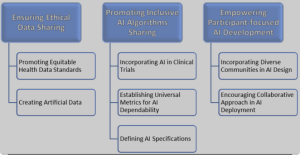The potential impact of AI on organizations venturing into healthcare is substantial and multifaceted. The purpose of this study is to highlight key AI’s potential impact on organizations venturing in healthcare sector:

AI’s Potential Impact on Organizations Venturing in Healthcare
-
Table of Contents
ToggleDiagnostic and Imaging Advancements:
- AI can enhance medical imaging interpretation, helping in the early detection and diagnosis of diseases. It can analyze complex data from various imaging modalities like X-rays, MRIs, and CT scans, assisting healthcare professionals in making more accurate and timely diagnoses.
-
Predictive Analytics and Population Health Management:
- AI can analyze large datasets to identify patterns and trends, enabling predictive analytics for disease outbreaks, patient outcomes, and resource utilization. This aids in proactive healthcare management and resource allocation.
-
Personalized Medicine:
- AI can analyze genetic and molecular data to tailor treatments based on an individual’s unique characteristics. This can lead to more effective and personalized therapeutic interventions.
-
Drug Discovery and Development:
- AI algorithms can accelerate drug discovery by analyzing vast datasets and predicting potential drug candidates. This can significantly reduce the time and cost involved in bringing new drugs to market.
-
Virtual Health Assistants and Chatbots:
- AI-powered virtual assistants can enhance patient engagement, provide health-related information, and assist in managing chronic conditions. Chatbots can offer immediate responses to patient queries and help streamline administrative processes.
-
Operational Efficiency and Automation:
- AI can optimize administrative tasks, such as scheduling, billing, and record-keeping, leading to improved operational efficiency and reduced administrative burden on healthcare professionals.
-
Remote Patient Monitoring:
- AI enables continuous monitoring of patients in real-time, especially those with chronic conditions. This helps in early detection of health issues, reducing hospital readmissions and improving overall patient outcomes.
-
Cybersecurity in Healthcare:
- With the increasing digitization of healthcare records and the adoption of telemedicine, AI plays a crucial role in enhancing cybersecurity measures. It can identify and respond to potential threats, safeguarding patient data and maintaining the integrity of healthcare systems.
-
Ethical and Regulatory Considerations:
- As AI becomes more integrated into healthcare, organizations need to navigate ethical considerations related to patient privacy, consent, and bias in algorithms. Regulatory frameworks are evolving to address these concerns and ensure responsible AI deployment.
-
Education and Decision Support:
- AI tools can provide valuable decision support for healthcare professionals, offering relevant information, treatment options, and guidelines. Additionally, AI-driven educational platforms can enhance training for medical professionals.
Organizations venturing into healthcare should carefully consider the ethical, legal, and social implications of AI implementation. Collaboration with healthcare professionals, adherence to regulatory standards, and ongoing monitoring of AI systems are essential for successful integration and positive impact on patient care.
